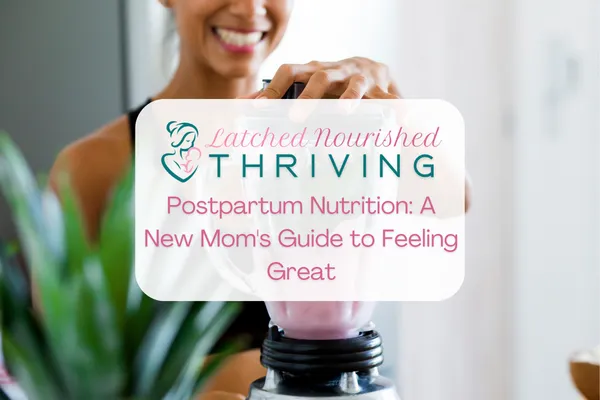Welcome to the Latched Nourished Thriving Blog!
Embrace Your Breastfeeding Journey with Confidence and Care. At Latched Nourished Thriving, we understand that breastfeeding is more than just a feeding method; it's a journey of health, bonding, and love. Our blog is dedicated to providing you with expert insights, practical tips, and compassionate support to make this journey fulfilling and empowering.

Postpartum Nutrition: A New Mom's Guide to Feeling Great
Introduction:
Congratulations new moms! You've made it through pregnancy and childbirth, and now it's time to focus on recovery and taking care of your new little one. One of the most important aspects of postpartum recovery is proper nutrition. As a new mom, you may be wondering what you should be eating to feel your best and support your body through breastfeeding and healing. In this guide, we'll go over the key nutrients your body needs after childbirth and how to get them.
Nutrition During Lactation
Proper nutrition after giving birth and while breastfeeding is different than before motherhood. In fact, while breastfeeding you need more calories, vitamin and mineral than at any other time in your life! While pregnancy requires an extra 250 calories per day and an uptick in some vitamins and minerals, but breastfeeding requires an extra 500 calories or more per day, especially if you're experiencing an oversupply! Some of our nutrient requirements double or triple while breastfeeding. With over half of the population already in a deficient state before pregnancy, its no wonder why new mothers are so exhausted! Nutrient deficiencies lead to low energy states where we can experience fatigue, brain fog, sluggishness, forgetfulness and more. So what nutrients are you at most risk for being low on?
Protein
When it comes to macronutrients during breastfeeding, protein is Queen! Protein is essential for building and repairing tissues, and its importance only increases after childbirth. Breastfeeding moms require almost double the amount of protein as before (from 0.8-1.0 g/kg to 1.7-1.9 g/kg). If you are vegan or vegetarian, this requires planning to meet! Even if you're not, it can still be a struggle. Since most advertised snacks are carbohydrate based while breastfeeding, start by swapping your snacks for high protein alternatives. Lean meats, eggs, dairy, beans, and legumes can all be great sources of protein.
Magnesium
After delivery, magnesium is crucial for the development of the breast-blood barrier, the barrier responsible for putting nutrients into your milk. When we are in a deficient state, that barrier can be leaky, which mean instead of concentrating nutrients into your milk, they leak back into your blood supply making your milk less nutritious for baby. Unless addressed, nutrient deficiencies can develop in baby especially when it comes to water soluble vitamins. Good sources of magnesium include leafy green vegetables, nuts, seeds, and whole grains. Supplementation is sometimes necessary. An easy way to increase your magnesium is through your skin! Using magnesium based creams or lotions or adding epsom salts to your bath at home can increase your intake significantly. If you're truly deficient, adding in floatation therapy in a float tank can boost your reserves quickly and easily.
B6 and B12
Two of the most common vitamin deficiencies in breast milk happen when mom herself is deficient in B6 and B12. B6 is important for the immune system while B12 helps with the nervous system. These deficiencies can be avoided by incorporating foods like lean meats, salmon, tuna, dairy, and fortified cereals into your diet. A supplement may also be necessary if a deficiency is detected.
Iron
Iron is crucial for preventing anemia and is one of the most common nutrient deficiencies postpartum. With the need to make more blood volume and the blood loss associated with childbirth, it's easy to see why this is so common. You can easily add more iron to your diet by eating foods such as lean meats, poultry, seafood, beans, and fortified cereals. Another option is to incorporate a lucky iron fish into your cooking routine.
How to Know if You're Nutrient Deficient
It can be difficult to know if you're getting the right nutrients in your diet, especially as a new mom when time and energy are both scarce. That's why we created a simple quiz to help you determine if you're at risk for a nutrient deficiency. Taking our latest quiz is a great way to check in with yourself and see where you might need to make some adjustments to your diet.
Do you already know you're nutrient deficient? You don't have to figure it out on your own! Check out our latest course: NourishMama! It has all of the information you need to design a personalized food plan for your postpartum recovery. You even have the option of adding on monthly group coaching sessions with me, Dr. Lauren, to ensure all of your nutrition question are answered and keep you on track for meeting your goals! You're never alone here at Latched Nourished Thriving! Get on the path to a Nourished and Thriving life today!

Follow Us
Follow Us
The content on this website is for informational and educational purposes only and is not intended as a substitute for medical advice, diagnosis, or treatment from your personal healthcare provider.
While Dr. Lauren Davis is a licensed physician, your use of this website does not create a doctor–patient relationship. Always consult with your own qualified healthcare provider before making any changes to your diet, supplements, medications, or healthcare routine—especially during pregnancy, postpartum, or while breastfeeding.
The programs, courses, and recommendations shared on this site are designed to support postpartum wellness and recovery but may not be appropriate for all individuals. Results vary based on individual biochemistry, lifestyle, and adherence.
By using this website, you agree to hold harmless Dr. Lauren Davis and Latched Nourished Thriving LLC from any liability arising from the use or misuse of the information provided.
Services
More
Contact Us
9 Bethel Rd, #1015, Somers Point NJ 08224
Monday - Thursday, 9:00 am - 5:00 pm EST
© Copyright 2026. Latched Nourished Thriving, LLC. All rights reserved.

